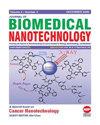Non-Muscle Myosin IIC as a Prognostic and Therapeutic Target in Cancer
IF 2.9
4区 医学
Q1 Medicine
引用次数: 0
Abstract
Cancer metastasis is associated with epithelial-mesenchymal transition (EMT), and NMII is linked to EMT. Calcium sensitization through ROCK activates myosin II, contributing to metastasis. NMII undergoes phosphorylation at Thr18/Ser19, affecting its function and involvement in processes like exocytosis, apoptosis, and transcellular intravasations. Inhibition of myosin II ATPase activity blocks cytokinesis, highlighting its role in cell cycle regulation. NMII has distinct binding motifs and sites for regulation, including Thr18/Ser19 via kinases/phosphatases, Ser1/Ser2/Thr9 via phosphokinase C, and involvement in cytokinesis via contractile ring formation. These characteristics make NMII a potential therapeutic target. NMII-C is found to be less expressive in glioma (40% low expression, 60% high expression), not showing prognostic value. However, in stomach cancer (35–65% expression) and renal cancer (40–60% expression), NMII-C appears to have prognostic significance. NMII-C’s prognostic value has not been reported in various other cancers, including thyroid, lung, liver, colorectal, urothelial, endometrial, head and neck, melanoma, prostate, testicular, pancreatic, breast, cervical, and ovarian cancers, highlighting a need for further research in these areas. Some pharmacological agents such as Blebbistatin, DT-13, Statins, and Y27632 have shown promising potential against NMII-C in cancer therapy, with positive results in pre-clinical studies and ongoing clinical trials. Understanding the specific functions and regulation of NMII isoforms, particularly NMII-C, may provide valuable insights into the development of targeted cancer therapies. Additionally, the study suggests that NMII-C may have prognostic importance in specific cancer stages, offering a foundation for further exploration of NMII-C’s mechanisms of action for future medical interventions.作为癌症预后和治疗靶点的非肌球蛋白 IIC
癌症转移与上皮-间质转化(EMT)有关,而 NMII 与 EMT 相关。钙敏化通过 ROCK 激活肌球蛋白 II,从而促进转移。NMII 在 Thr18/Ser19 处发生磷酸化,从而影响其功能并参与细胞外分泌、细胞凋亡和跨细胞内侵袭等过程。抑制肌球蛋白 II ATPase 的活性会阻碍细胞分裂,从而凸显其在细胞周期调控中的作用。NMII 有独特的结合基序和调节位点,包括通过激酶/磷酸酶调节 Thr18/Ser19,通过磷酸激酶 C 调节 Ser1/Ser2/Thr9,以及通过收缩环的形成参与细胞分裂。这些特点使 NMII 成为潜在的治疗靶点。研究发现,NMII-C 在胶质瘤中的表达较低(40% 低表达,60% 高表达),不具有预后价值。然而,在胃癌(35-65% 表达)和肾癌(40-60% 表达)中,NMII-C 似乎具有预后意义。NMII-C 在其他各种癌症(包括甲状腺癌、肺癌、肝癌、结直肠癌、泌尿道癌、子宫内膜癌、头颈部癌、黑色素瘤、前列腺癌、睾丸癌、胰腺癌、乳腺癌、宫颈癌和卵巢癌)中的预后价值尚未见报道,这凸显了在这些领域开展进一步研究的必要性。一些药理制剂,如 Blebbistatin、DT-13、他汀类药物和 Y27632 等,已在癌症治疗中显示出对抗 NMII-C 的巨大潜力,并在临床前研究和正在进行的临床试验中取得了积极成果。了解 NMII 同工酶(尤其是 NMII-C)的特定功能和调控,可为开发癌症靶向疗法提供有价值的见解。此外,该研究还表明,NMII-C 对特定癌症阶段的预后可能具有重要意义,这为进一步探索 NMII-C 的作用机制以促进未来的医疗干预奠定了基础。
本文章由计算机程序翻译,如有差异,请以英文原文为准。
求助全文
约1分钟内获得全文
求助全文
来源期刊
CiteScore
4.30
自引率
17.20%
发文量
145
审稿时长
2.3 months
期刊介绍:
Information not localized
文献相关原料
| 公司名称 | 产品信息 | 采购帮参考价格 |
|---|

 求助内容:
求助内容: 应助结果提醒方式:
应助结果提醒方式:


